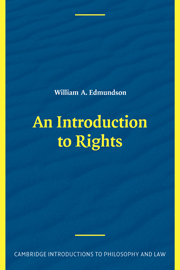Book contents
- Frontmatter
- Contents
- List of Tables
- Preface
- Part One The First Expansionary Era
- 1 The Prehistory of Rights
- 2 The Rights of Man: The Enlightenment
- 3 “Mischievous Nonsense”?
- 4 The Nineteenth Century: Consolidation and Retrenchment
- 5 The Conceptual Neighborhood of Rights: Wesley Newcomb Hohfeld
- Part Two The Second Expansionary Era
- Bibliographical Notes
- References
- Index
4 - The Nineteenth Century: Consolidation and Retrenchment
Published online by Cambridge University Press: 08 January 2010
- Frontmatter
- Contents
- List of Tables
- Preface
- Part One The First Expansionary Era
- 1 The Prehistory of Rights
- 2 The Rights of Man: The Enlightenment
- 3 “Mischievous Nonsense”?
- 4 The Nineteenth Century: Consolidation and Retrenchment
- 5 The Conceptual Neighborhood of Rights: Wesley Newcomb Hohfeld
- Part Two The Second Expansionary Era
- Bibliographical Notes
- References
- Index
Summary
The Reign of Terror in revolutionary France marked the end of the first expansionary period of rights discourse. The Terror discredited freewheeling rights claims as proper rhetorical tools in the service of reform. The Declaration of the Rights of Man and the Citizen remained and still remains an object of veneration for most of the French people, but no French thinker since Rousseau has had a major influence on our understanding of rights. Beyond France, the post-Terror reaction against rights rhetoric was far more pronounced in England than in the United States. This is not surprising, since the affinity between France and the United States was undiminished, and the Americans – unlike the British – had little reason to fear an adverse spillover from the further course of French developments. Accordingly, the career of rights took different paths on different sides of the Atlantic. But these paths were not entirely diverse, in large part because in both places the issue of slavery came to dominate the moral agenda.
The Utilitarian Formula: Rights as Rules
At the beginning of the nineteenth century, utilitarianism was already becoming the dominant moral theory in England, but it was not without its own difficulties. The challenges that utilitarians faced included that of explaining how the pursuit of the greatest utility could somehow be self-limiting. Rule utilitarianism was designed to answer this challenge, but it required further elaboration, as we shall see.
- Type
- Chapter
- Information
- An Introduction to Rights , pp. 61 - 86Publisher: Cambridge University PressPrint publication year: 2004



